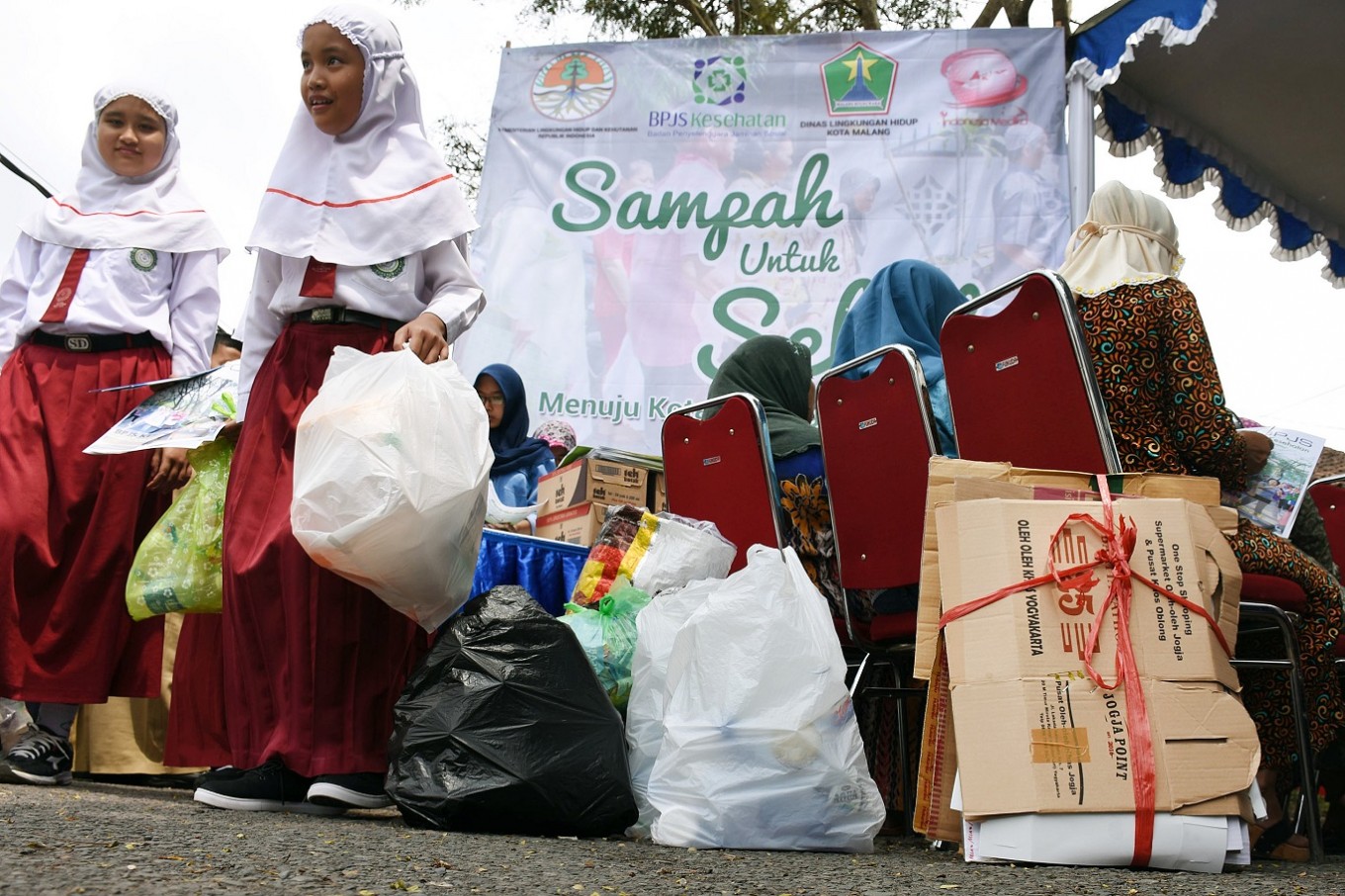Popular Reads
Top Results
Can't find what you're looking for?
View all search resultsPopular Reads
Top Results
Can't find what you're looking for?
View all search resultsFrom trash to healthcare in Malang
Recycling is the red line that connects low-income earners and their need for proper medical treatment.
Change text size
Gift Premium Articles
to Anyone
S
ince its establishment in 2010, the Waste Insurance Clinic initiated by doctor Gamal Albinsaid from non-profit organization Indonesia Medika in Malang, East Java, has provided primary health care services for nearby residents in return for nothing but recyclable trash.
The clinic only focuses on primary care, but Gamal strives to improve the service in order to help patients who need intensive treatment by cooperating with the Health Care and Social Security Agency (BPJS Kesehatan).
“The BPJS health care scheme guarantees secondary and tertiary health care services for people,” he said while commemorating the National Waste-Free Day on Feb. 21 at the clinic in Bumiayu subdistrict, Kedungkandang.
The clinic’s health care program is a collaborative effort between BPJS Kesehatan, the Malang Environment Agency, students and residents.
BPJS Kesehatan was launched in 2015 to help low-income families afford health care. The government prepared a fund to cover premiums for poor people and invited others to take part in the health insurance program. Lowincome earners can apply for a policy that covers third-class hospital treatment for a premium set at Rp 25,500 (US$1.91) per month.
Read also: Photo exhibition raises awareness about children with HIV
Residents collect trash in the form of plastic bottles and used paper worth Rp 10,000 every month to be entitled to the clinic’s health care service. Gamal is looking for various sources of funds to cover the remaining Rp 15,500 to get the patients registered with the BPJS health insurance for third-class hospital services.
“Corporate social responsibility funds from companies and academicians are the present option,” said Gamal.
The doctor, who has received a UK government award for his achievement, is convinced of the considerable impact of this program, because those who have to undergo inpatient care or heart surgery, for instance, will be served through the BPJS arrangement.
Gamal also regards this cooperation scheme as a solution to stagnation in BPJS premium collection and as a way to ease the government’s burden of subsidizing the coverage of poor people under the BPJS Kesehatan. It was estimated that the national health insurance suffer losses of about Rp 6 trillion last year.
“This program entails community empowerment through waste management, which will affect people’s lifestyle and create a clean environment,” Gamal said.
Read also: Young entrepreneurs drive social, ecological innovation
 Dedication: A patient (right) gets her blood pressure checked.(JP/Aman Rochman)
Dedication: A patient (right) gets her blood pressure checked.(JP/Aman Rochman)
Ponali, a resident of Bumiayu who suffered a stroke for four years, said he benefited from the health care provided at Gamal’s clinic.
“I was bedridden, only lying on the bed,” he said.
After two years of intensive treatment at the clinic, the 61-year-old could eventually walk again with the help of a walking cane.
Only 100 of the 230 patients at the clinic have been registered as BPJS participants in the pilot project.
“The number will increase when the aid funds are adequate and public interest rises,” Gamal said with confidence.
He also plans to launch a waste-for-health care program that will allow people to receive medical treatment in return for trash they bring along as a means of payment and a corporate-care program that invites companies to donate recyclable waste to cover treatment for the poor.
Meanwhile the Homedika Care program allows poor people to get health care services at home by paying with 3 kilograms of trash. Community members can also donate waste to help poor people obtain free health care services through a charity program.
“We’re developing a digital platform to connect medical personnel with the public through the Siapa Peduli [Who’s Concerned] website,” Gamal said. Those in need can contact Indonesia Medika’s call center. The website also raises funds for poor patients.
The head of BPJS’s primary health service unit in Malang, Muji Hariyanti, welcomes the waste insurance program.
“The cooperation between BPJS Kesehatan and wastebased insurance is the first of its kind. This is very interesting, because the BPJS program can work well under this scheme,” Muji said, adding that her office would also welcome other possible schemes.
Open daily from 4 p.m. to 8 p.m. except on weekends and public holidays, the Waste Insurance Clinic welcomes new patients, who only need to submit recyclable trash in exchange for membership cards.
After explaining their complaints, having their blood pressure taken and their weight registered, patients are medically examined and given prescribed medicine. The health care workers are mostly young physicians, nurses, midwives and pharmacists who spare their time to serve the patients for free.











